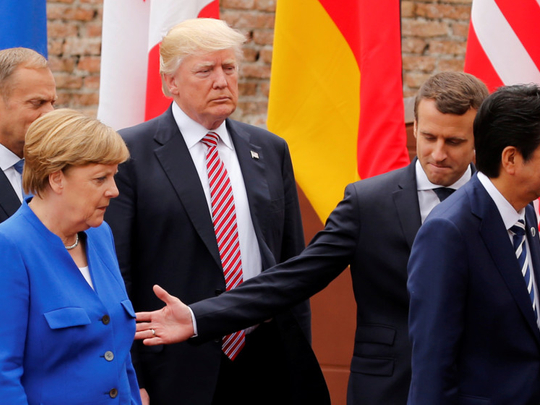
The Atlantic is rough these days, as stormy disregard blows from the United States to Europe and back. After President Donald Trump attacked Germany’s trade practices, Chancellor Angela Merkel told a campaign rally in Munich that “the times we can completely rely on others are somewhat over” and that “we Europeans must take our destiny into our own hands.” Trump reacted with a tweeted threat, citing Germany’s failure to meet Nato’s military spending goals, saying “this will change.”
On many levels, despite all the rhetorical thunder, little has changed in substance, so far. Military experts say that within Nato, day-to-day business is somewhat hampered because positions on the American side are still unfilled but that it’s otherwise pretty much business as usual. They point out that the American brigade deployed in January 2017 to Eastern Europe to reassure that region about Russia is still there.
The same is true for economic cooperation, at least in Germany. Scientists continue working together, and Germany’s economics minister, Brigitte Zypries, recently had a constructive, friendly meeting in Washington with Commerce Secretary Wilbur Ross and the United States trade representative Robert Lighthizer.
And yet Merkel’s statement was much more than just campaign chatter. Yes, she needs to assert independence in the face of a stronger-than-expected challenge from the centre-left Social Democrats. But she meant what she said, and her statement accurately captures a new direction in transatlantic relations.
As Seibert said, this isn’t the first time a European has called for self-sufficiency from America. It has been an annoying refrain for decades. But suddenly it’s being sung with new urgency — and excitement.
For all the fears of Brexit and the National Front ripping apart Europe, the continent has an unprecedented opportunity to move closer together. Vladimir Putin’s annexation of Crimea in 2014 created a need to act in solidarity against an outside threat. For all the bitter fights, the union came out stronger for its struggles during the financial and refugee crises.
The German-French axis, the heart of the European project, is likely to gain new strength with the energetic President Emmanuel Macron in Paris, who won the election on a decidedly pro-European ticket. And the 2016 Brexit referendum put the European Union in fight-or-flight mode — and many seem to opt for fight along with France and Germany.
None of this has anything to do with Trump, who came into the story late. But with all this already underway, he will undoubtedly accelerate the trend away from the United States and toward a more unified, independent continent.
Don’t expect a sudden break, though. It’s not what Europe does. Take all the recent steps toward a unified military force. At last fall’s summit in Bratislava, Slovakia, the big achievement was asking the European Commission to come up with a “concrete implementation plan” to better coordinate the 27 national military forces.
“This could have quite an impact,” said Claudia Major, a senior associate at the German Institute for International and Security Affairs — which is true, but also an indicator of how slowly things move on the continent.
And without an independent military, Europe is going to continue to rely on the United States. The European Union states together spend about half of what the United States spends on its military. It would take the European states decades to catch up.
In other words, the current transatlantic contretemps are real and will have a significant impact — with limits. Europe won’t be going its own way. Whatever its leaders and public’s think about America, they need it, and so their quest for self-sufficiency will be more about levelling the playing field than leaving the game.
What really threatens the transatlantic relationship is not the European quest for more self-sufficiency but the loss of trust that Merkel made so clear in her comments in Munich. We will continue to need the United States, but that need will be tempered by a worrying loss of trust in its leadership.
Over the next few years, transatlantic relations will be defined by a single question: Which is more important, the practical administration of tangible mutual economic and defence interests, which will continue unimpeded, or the intangible but vitally important emotional bond, which is fast wearing away? To put it differently: How long can the United States and Europe work together without being friends?
Anna Sauerbrey is an editor on the opinion page of the newspaper Der Tagesspiegel and a contributing opinion writer.











